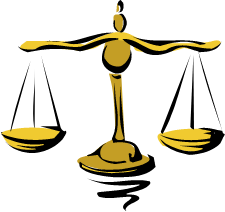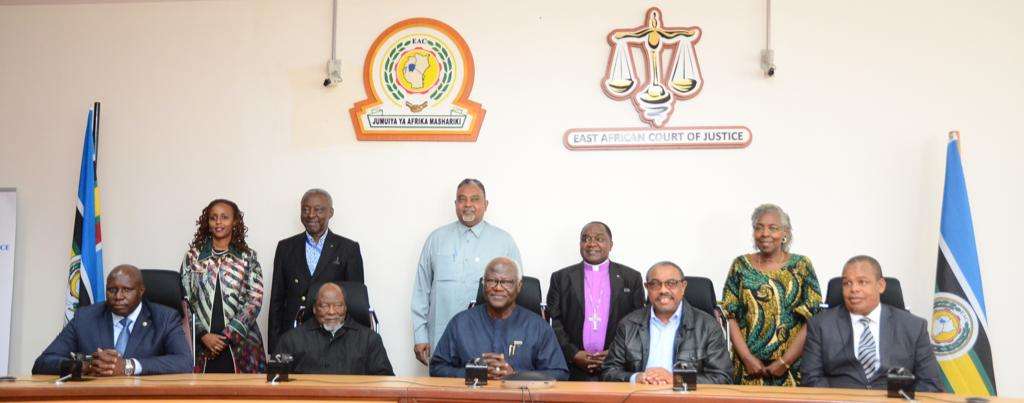East African Court of Justice, Arusha, 20th July 2023: Retired Sierra Leonean President Ernest Bai Koroma has reaffirmed the critical role of national and regional courts in strengthening the democratisation process and promoting good governance in Africa.
President Koroma said that regional courts such as the East African Court of Justice (EACJ) complement national courts in upholding the rule of law and the respect for human rights thereby sustaining the growth of democracy on the continent.
President Koroma said that in instances where people had lost faith in judicial systems, there were inherent risks for sustainable peace and stability.
The retired Head of State said that strong judicial systems limit the risk of institutional and state capture by giving citizens alternatives for redress where they feel aggrieved, adding that credible judicial systems would advance the cause of democracy in Africa.
President Koroma urged the EACJ, the Arusha-based judicial arm of the East African Community (EAC), to stick to the law while interpreting the EAC Treaty and ensure that there is justice and fair play in handling cases filed before it.
The retired President was speaking in Arusha, Tanzania when he led a high-powered delegation comprising H.E. Joaquim Chissano, former President of Mozambique, and H.E. Hailemariam Desalegn, former Prime Minister of Ethiopia on a familiarisation tour of the EAC Headquarters.
The three leaders were among former Heads of State and Government who were in Arusha to attend the Africa Drive for Democracy Conference (D4D) Elders Retreat and Annual Conference between Monday, 17th July to Thursday, 20th July, 2023. They were received at the EAC Headquarters by the Judge President of the EACJ, Justice Nestor Kayobera, on behalf of the EAC Secretary General, Hon. (Dr.) Peter Mathuki.
Speaking at the event, retired Mozambican President Joaquim Chissano emphasised the role of strong institutions, youth and women and good leadership in promoting democracy.
President Chissano said that courts were critical to combating corruption, promoting respect for human rights and acting as arbiters in conflicts and disputes.
On his part, former Ethiopian Prime Minister Hailemariam Desalegn hailed the role being played by the EAC and other regional economic blocs in the drive towards an integrated Africa, adding that multiple membership to various regional economic communities could undermine the spirit of speedy integration of the continent.
H.E. Desalegn said that existing regional mechanisms including the EACJ should be properly funded to enable them execute their mandates effectively.
Welcoming the three former Heads of State and Government, the EACJ Judge President Nestor Kayobera said that the EACJ said that the Court is a stakeholder in matters concerning good governance across the region.
“Our role includes upholding the principles of democracy, the rule of law, accountability, transparency, social justice, gender equality, and promotion and protection of human and peoples’ rights in accordance with the provisions of the African Charter on Human and Peoples Rights as enshrined under Article 6(d) of the Treaty for the Establishment of the East African Community,” said Justice Kayobera.
Justice Kayobera said that under the EAC Treaty, Partner States undertook to abide by the fundamental principles that govern the achievement of the objectives of the Community and abstain from any measures likely to jeopardize the achievement of these objectives.
“Where any of these principles are violated by the EAC Partner States, the Organs and Institutions of the Community, legal or natural persons resident in the EAC, can bring a complaint to the EACJ without being required to exhaust local remedies,” said the Judge President.
“However, the time limit to file a case is within 60 days when the complaint arose or when it came to the knowledge of the complainant, and no fees are charged for filing a case,” added Justice Kayobera.
“Majority of the cases filed in this Court are based on these principles, which is why I am proud to say that the EACJ is a stakeholder in good governance and democracy,” he added.
Justice Kayobera informed the delegation that EACJ sessions are held on a quarterly basis due to the ad hoc nature of the services of the Judges, adding that the workload has been increasing yearly necessitating more regular Court sessions to handle urgent matters.
“Unfortunately, at times with financial constraints, even the quarterly sessions are postponed, and this is a big challenge that needs to be addressed,” he said.
Also present at the event were: Dr. Salah Hammad, Head of the African Governance Architecture Secretariat at the AU; Justice Yohane Masara, EACJ Principal Judge; Ms. Makena Mwobobia, Executive Director – MS Training Centre for Development Cooperation; Rev. Dr. Benson Bagonza, Board Member, Centre for Strategic Litigation; Mzee Jenerali Ulimwengu, Board Member, Centre for Strategic Litigation, and; Ms. Christine Mutimura-Wekesa, the Deputy Registrar of EACJ.
About the EACJ
The East African Court of Justice (EACJ or ‘the Court’), is one of the Organs of the East African Community established under Article 9 of the Treaty for the Establishment of the East African Community. The Court was established in November 2001, its key mandate is to ensure the adherence to law in the interpretation and application of and compliance with the EAC Treaty.
Arusha is the temporary seat of the Court until the Summit determines its permanent seat. The Court’s sub-registries are located in the capitals of the following Partner States: Burundi, Kenya, Rwanda, Uganda, and United Republic of Tanzania.
For more information please contact:
Christine Mutimura-Wekesa
Deputy Registrar,
East African Court of Justice.
Arusha, Tanzania
Tel: 255-27-2162149
Email: cmwekesa@eachq.org

